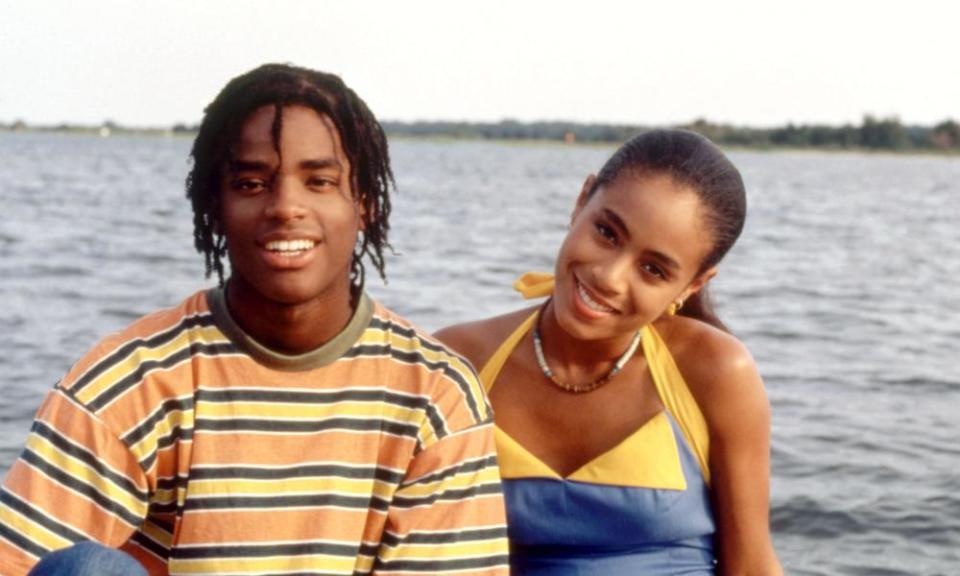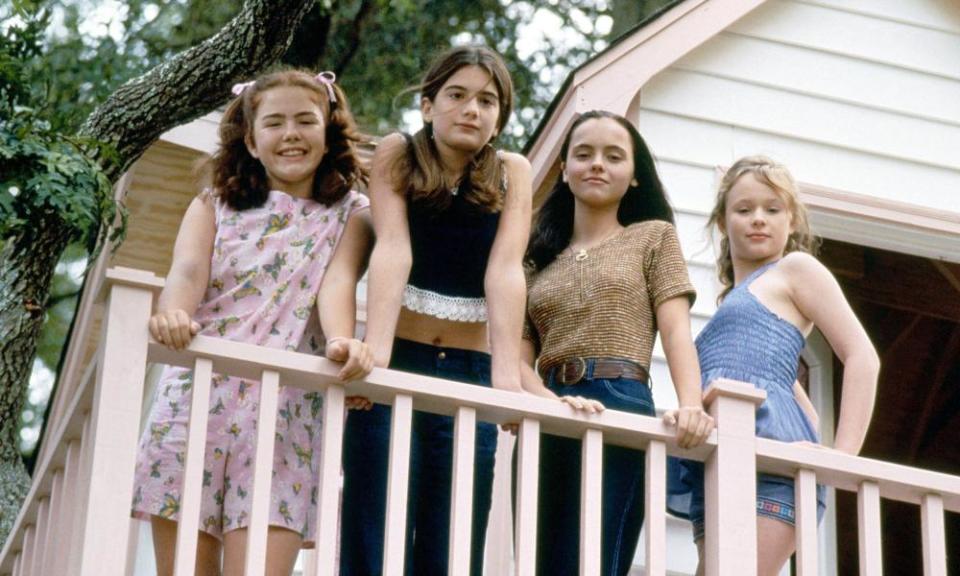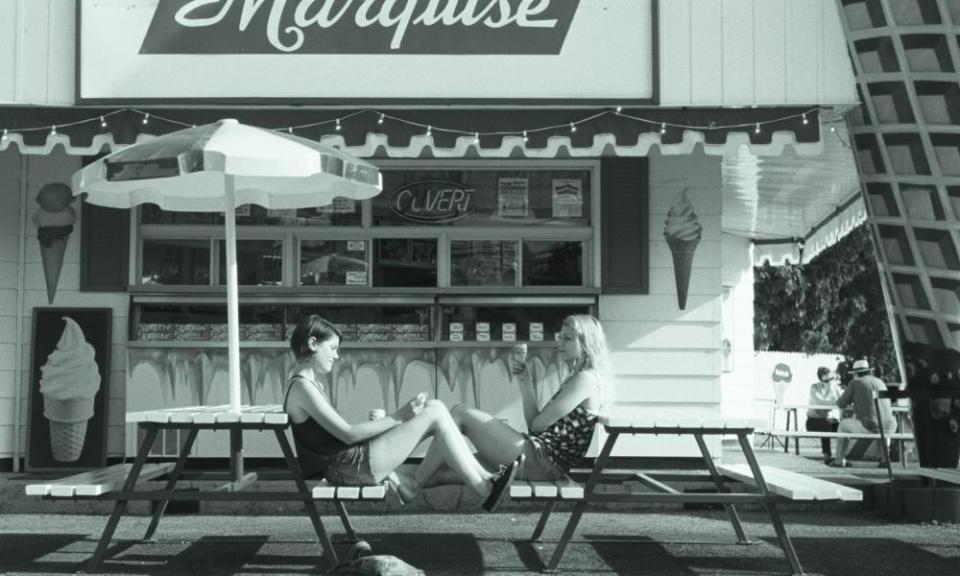Sun, sea and flings: our writers on their favorite summertime movies
Swimming Pool
Anybody who has tried to multitask over a Zoom-assisted summer of late will find much to relate to in Swimming Pool, French director François Ozon’s first English language feature, about a working holiday that is anything but relaxing. British crime novelist Sarah Morton (Charlotte Rampling) has hit a creative wall, and retreats to her smarmy publisher’s summer home in the south of France. Nothing like a change of scenery to help a hit-maker press the refresh button. Our belted-up, beige-clad protagonist stocks up on tubs of yogurt and clacks away at her computer, determined to rack up a handsome word count. But the stultifying heat and the sensuality rising from the home’s other resident, the libertine daughter that her publisher never mentioned having, Julie (Ludivine Sagnier), wear away at Sarah’s calcified bearing (“she has a broomstick up her butt,” per Julie). Over these sweltering weeks, Sarah opens her hooded eyes and comes undone, and not just because she starts swilling gin and stabbing at midday profiteroles with a grapefruit spoon. Ozon’s depiction of Sarah’s awakening is electric, and rendered in a style that is, rather miraculously, both languid and taut. The film is bookended by scenes in an office, an unwelcome reminder that the laws of gravity apply to even the most gorgeously dizzying of dreams. Lauren Mechling
Summertime
It’s lovely to have a summer fling, and even nicer if you learn something about yourself in the process. But David Lean’s Summertime, anchored by a frantic, fearless Katharine Hepburn, takes romantic Roman Holiday cliches several shades darker. Hepburn plays a retired American secretary who blows her savings on a solo trip to Venice and plunges into the city with abandon. It’s almost as if she’s over-compensating for something, which of course she is. Privately, and not-so-privately too, she is gripped by crippling loneliness and manic mood swings that send her from giddy laughter to tears. She yearns for romance which she finds, perhaps a little too quickly, in a smooth-talking wheeler-dealer played by Rossano Brazzi (AKA heaven on a stick). As inviting as her paramour is Venice itself, a Technicolor fantasy with charming pensioni and gondoliers with the manners of a Jane Austen gent. Hepburn gives the sun-drenched melodrama its modernity and its bite; she is as arresting as an ice cube down your back on a sweaty day. Owen Myers
The Inkwell

Because I was raised by Jamaican immigrants in the midwest, I had no idea Black families retreated to their own little corner of Martha’s Vineyard every summer until this 90s cult classic. In it, a troubled teen shrinks from a beachy Fourth of July hangout with upper-crust kinfolk only to wind up falling in love and coming of age. The all-Black cast mixes acting royalty (Joe Morton, Vanessa Bell Calloway) and up-and-comers (Jada Pinkett, Morris Chestnut) with the Heath Ledger of Black romcom leading men – Love Jones’s Larenz Tate. But the thing that still makes this Terence Blanchard-scored film so special is how it lets the Black people in it just be. Sure, they have their political and cultural differences but for the most part The Inkwell has the unhurried vibe of an all-white indie project. It’s a shame there aren’t more like it, and that Matty Rich hasn’t directed another feature since. Andrew Lawrence
Mid-August Lunch
Four very elderly women trapped in a Rome flat at the height of summer sounds like a disaster movie. And did I mention it was made by the men behind Gomorrah? Yet there are no gruesome shootings nor vivid depictions of dehydration in Mid-August Lunch. Rather, these fabulously coiffured nonagenarians are cosseted in fine style, their every appetite catered for by the beleaguered son of one of them – lumbered with three extra in exchange for waived rent and medical bills. Once he relaxes, with the aid of wine and a tramp, they all have a great time, chatting and squabbling over pasta and asti. Gianni Di Gregori’s comedy is more of a meal than it first seems. It’s about compassion and respect, as well as good cheese and bad telly. In a climate like today’s, it’s quite a sorbet. Catherine Shoard
Do the Right Thing
It’s the hottest day of the summer in Bed-Stuy, Brooklyn, and Do the Right Thing opens with Mister Señor Love Daddy (Samuel L Jackson) issuing a “Jheri curl alert”: “If you have a Jheri Curl, stay in the house or you’ll end up with a permanent plastic helmet on your head forever.” In Spike Lee’s slice-of-life, the temperature climbs near 100 degrees. Children commandeer the fire hydrants as makeshift sprinklers. Bodies glisten with sweat and melt ice cubes, but it’s too hot for sex. And the racial tensions that perpetually simmer in the city are about to boil over. Does Lee’s Mookie throw the trash can through the window of Sal’s Famous on a cooler day? Perhaps not. But through the lens of cinematographer Ernest Dickerson, Do the Right Thing pops with colors that suggest both the vibrancy and the volatility of a neighborhood on the brink. Scott Tobias
Now and Then

There’s something visceral about Now and Then. Just the mention of the film and I can smell the freshly cut grass, hear the Archies’ Sugar, Sugar, feel my sticky ice-pop-coated hands, and see faint bruises on legs, surely from running down the street and hopping on my bike to make it home before dinner. If you haven’t seen the 1995 classic, it’s a coming-of-age dramedy that follows four female friends over the course of a summer when they were kids and their subsequent reunion some decades later. It toggles back and forth between the 70s and the 90s, providing plenty of laughs interspersed with heart-wrenching moments of maturation. While I’ll be irrevocably angry that they cast Rosie O’Donnell as Christina Ricci’s elder counterpart, there’s no other film that better captures the simultaneous anguish and joy that comes with girlhood. Come for the A-list cast (it also stars Demi Moore, Melanie Griffith and 90s heartthrob Devon Sawa!) and stay for the nostalgia: every young person who grew up in suburbia, in any decade can take away something wonderful from the film. Jenna Amatulli
My Summer of Love
The most memorable summers of our youth had a breathtaking sense of cinema to them, as if our lives had suddenly expanded to widescreen, the scenery that much richer, our emotions that much bigger. In Paweł Pawlikowski’s seductive Yorkshire-set Bafta-winner My Summer of Love, the dull, washed-out grind of one girl’s life – lonely, listless and lumped with a born-again ex-con brother turning their pub into a church – is given a lush, high-definition upgrade when she meets another from the other, posher side of the moors. For Mona, played by an exquisite Natalie Press, the grandiose, Edith Piaf-soundtracked life of Tamsin, a star-making turn from a young Emily Blunt, is as desirable as it is dangerous, igniting her sexuality but obscuring her better instincts. It’s a short, bittersweet and haunting little movie, alluringly scored by Goldfrapp, about the fires we choose to play with and the burns we then learn to accept. Benjamin Lee
Adventureland
The Summer That Everything Changed is a time-honored subset of the cinematic bildungsroman, but in Greg Mottola’s understated and infinitely quotable snapshot of post-collegiate ennui circa 1987, our boy James (Jesse Eisenberg in a persona-setting role) comes of age with more nuance than most. Fresh out of Oberlin and flat broke, he’s forced to spend the hot months minimum-waging it at his hometown amusement park, a set-up that would imply a familiar set of Hollywood hijinks. Mottola doesn’t so much defy the typical components of this comedy subgenre as he hones them to a finer point, crafting true-to-life characters and placing them in a recognizable past shaped by smartly deployed cultural markers. And on top of that: a no-skips soundtrack of the era’s choicest indie rock cuts, the first documented evidence that Kristen Stewart is a great actor, and Martin Starr as a self-proclaimed “pragmatic nihilist, I guess, or an existential pagan, if you will” who smokes a pipe and muses on Melville. Charles Bramesco
Double Indemnity
![DOUBLE INDEMNITY [US 1944] BARBARA STANWYCK, FRED MacMURRAY A PARAMOUNT PICTURE](https://s.yimg.com/ny/api/res/1.2/Dsqt.lwEWcG.8MhTh7ZdiA--/YXBwaWQ9aGlnaGxhbmRlcjt3PTk2MDtoPTU3Ng--/https://media.zenfs.com/en/theguardian_763/c1a46c0ae0e4bd8baac02b427b9d5b47)
Billy Wilder’s iconic caper, about a couple plotting murder over iced tea and bourbon, doesn’t oversell its summer vibes. It doesn’t have to. Barbara Stanwyck turns up the heat the moment her femme fatale Phyllis Dietrichson enters the frame. Fresh from sunbathing, she’s wearing only a towel and a dangerously inquisitive smile. Stanwyck’s performance is monumental: an awe-inspiring modulation of ease and precision as when she slinks into a sofa seat in her summer dress with a carefully calculated leg cross or gently leans into a helpless pout to lure Fred McMurray’s insurance agent Walter Neff. McMurray is great too as the hapless man thinking he’s got his hands on the steering wheel, not realizing Phyllis already clipped the brakes. They make a meal of Raymond Chandler’s pulpy dialogue in a movie playing a sinful and steamy (but Hays Code compliant) game of domination and desire. Double Indemnity set the bar for film noir. Wilder established the shadowy venetian blind aesthetics and the femme fatale pedigree. And the movie tapped into contemporary anxieties over war, modern capitalism, power-tripping men, unchecked ambition and blondes sticking it to the patriarchy long before Barbie met Oppenheimer. Radheyan Simonpillai
Tu Dors Nicole

There are better and more iconic summer movies, like the one about the rampaging shark or the one set on the hottest day of the year in Bed-Stuy, Brooklyn. But between annual rewatches of those classics, spare a balmy July evening for the itchy melancholia of Tu Dors Nicole (translation: You’re Sleeping, Nicole), a summer movie for those whose seasonal affective disorder hits during the warmer weeks. Shot on a crisp black-and-white that enhances the drab uneventfulness of its plot, Stéphane Lafleur’s sublimely bittersweet French-Canadian comedy follows a recent college graduate (Julianne Côté) as she ambles through a summer without plans or direction, casually stealing from the thrift store that employs her, nursing an unrequited crush, and drifting apart from her best friend. With dry amusement, the movie gets at how sad and lonely and even boring summer can be when your life is stuck in a rut – how the endless downtime of the season can feel like purgatory when you’ve got nothing to do and no way to fill the hours. Lots of movies make summer look like a vacation you’d never want to end, all skinny dipping and ice-cream. Here’s one that recognizes that fantasy for what it too often is: a shimmering mirage of the fun you’re supposed to be having while the weather and your schedule permits. AA Dowd
The Green Ray
![LE RAYON VERT [FR 1986] aka THE GREEN RAY film still MARIE RIVIERE, [unidentified]](https://s.yimg.com/ny/api/res/1.2/PqZi6oQXnxGGbgZ1mjN8FQ--/YXBwaWQ9aGlnaGxhbmRlcjt3PTk2MDtoPTU3Ng--/https://media.zenfs.com/en/theguardian_763/58979bee51037e3d97461685494ea36d)
Maybe no other movie feels like summer to me as much as the French New Wave director Éric Rohmer’s The Green Ray (often called Summer in North America). It centers around Delphine, a young woman who struggles to find her place as Paris empties for the summer holidays. As with the best of Rohmer, the film lives and breathes the stuff of the everyday, somehow imbuing it with a sense of significance. On one level, the film is a spectacular portrait of a woman in search of something she isn’t quite sure of; on another level, it effortlessly captures that summer restlessness to be somewhere with someone. It all ties together with the magical “green ray”, which is said to appear for the lucky few just as the sun disappears for the night. Veronica Esposito

 Yahoo Movies
Yahoo Movies 
